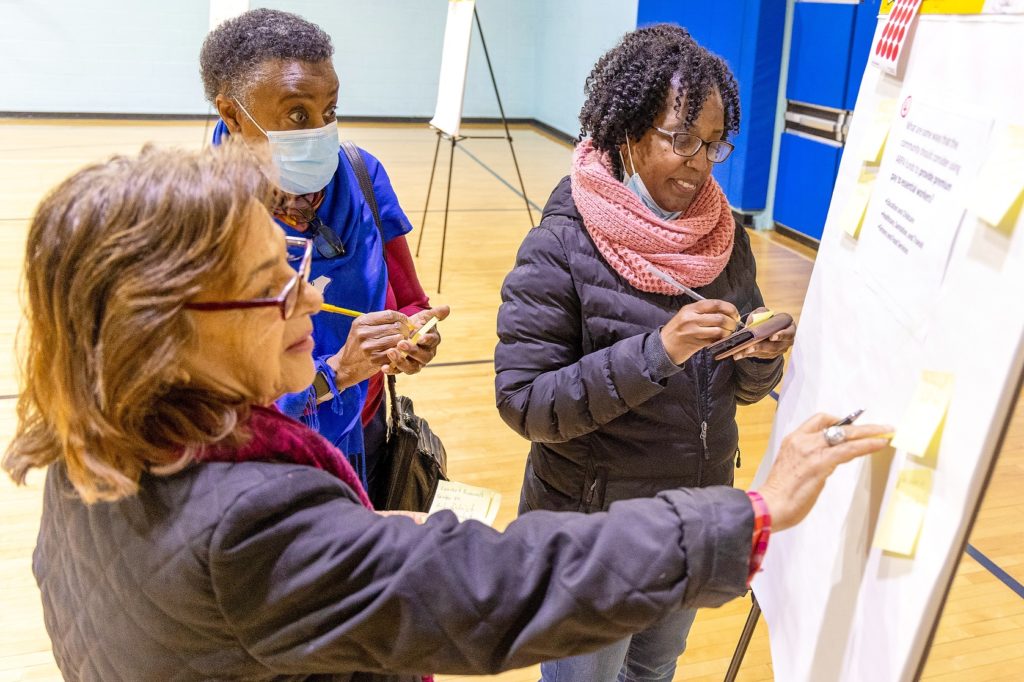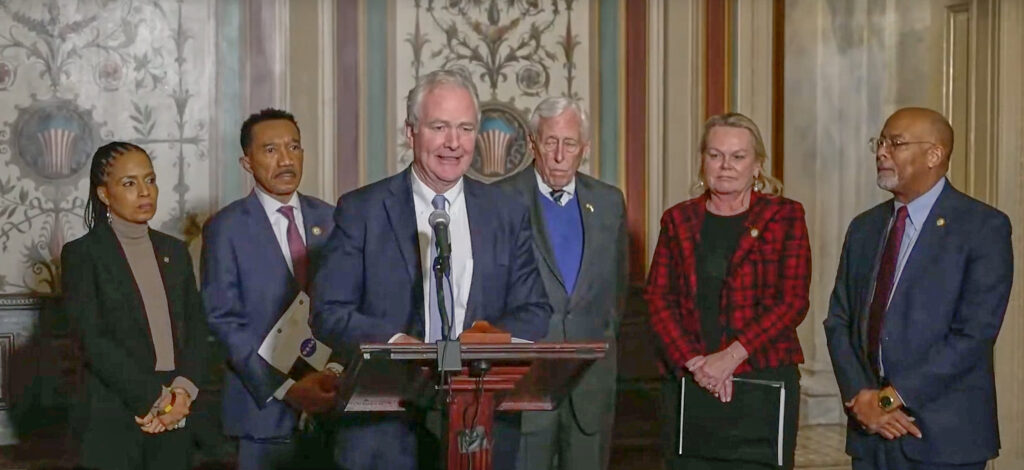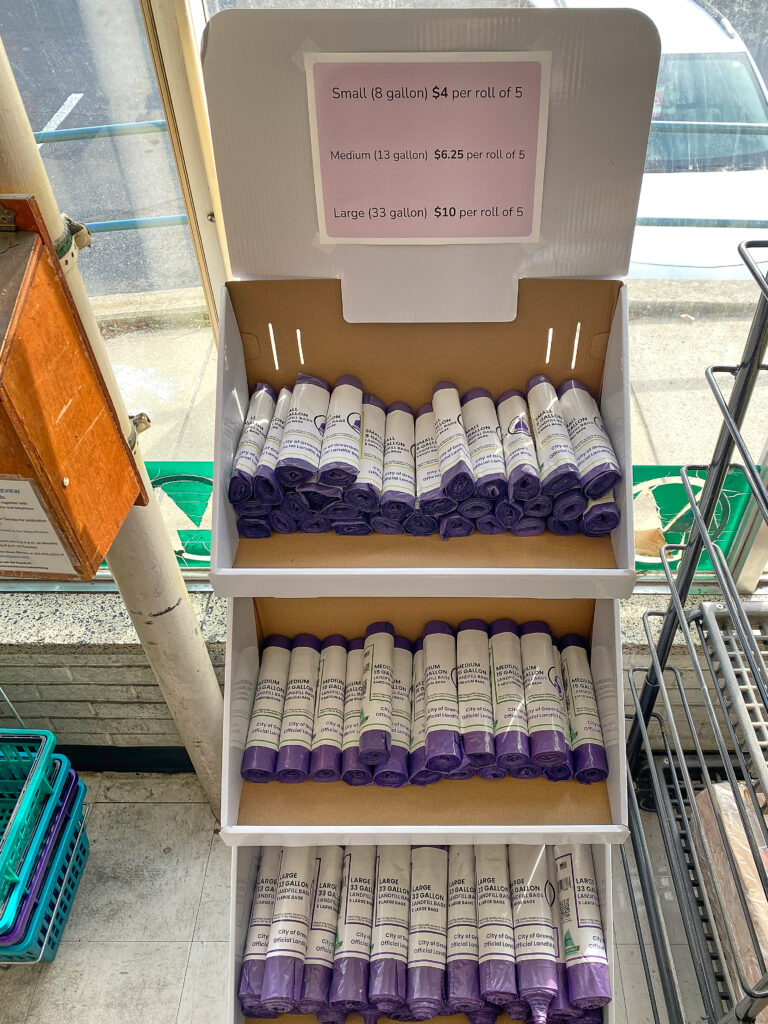The City of Greenbelt continues to solicit feedback on how to spend the remaining $21 million in federal American Rescue Plan Act (ARPA) funds to remediate effects of the Covid-19 public health emergency. Residents’ input on ARPA spending must be submitted by April 15 to the city website at engagegreenbelt.org so that city staff can review consolidated ideas with city council at a May 11 budget worksession.
The city’s contractor, Raftelis, facilitated the final in-person engagement session on March 29 at Springhill Lake Recreation Center. It started much like the prior two sessions, but there were early signs this meeting would be different. High ceilings and the buzz of ventilation systems in the gym made it hard to hear Raftelis’ explanation of ARPA.
During introductions, one resident persistently interrupted, attempting to focus instead on details of a March 28 city presentation about spending unrestricted ARPA formula funds. Acting City Manager Tim George had reported that a budget surplus for the 2022 fiscal year arose in large part from increased real estate tax assessments and ongoing efforts by staff to restrain city expenditures. For 2023, the city plans to recommend a variety of activities under the ARPA lost revenue formula, including replacing the Springhill Lake Recreation Center air handler and carrying out a bus stop accessibility study.
After these interruptions, Raftelis and city residents returned the meeting to its agenda and began generating ideas for ARPA spending on post-it notes and easels around the room. This was the best-attended session, with three children and over 20 adult residents from each region of the city.
An occupational therapist from Greenbelt East described how the Three Sisters Gardens kept neighbors together during pandemic isolation. She proposed enhancing and promoting the gardens to improve residents’ mental health and connectedness. A few other residents, meeting for the first time, excitedly shared thoughts, going back and forth between easels to refine and add post-it notes.
Urgent Needs
Jorge Benitez-Perez, an organizer with the Latino and immigration advocacy group CASA, helped ensure concerns from Spanish-speaking Franklin Park residents were interpreted for Raftelis’ report. Benitez-Perez was crucial to the meeting’s success, translating between English and Spanish, and writing down ideas from speakers of both languages. Residents organized by CASA did not want to break into smaller groups – they felt safer in communion together and with Benitez-Perez. As the discussion progressed, it became clear they presented far more urgent needs than many other ideas submitted whether in person, on easels or online.
Franklin Park residents, wary of their full names appearing in publication, described their collective experiences of the challenges of being a renter during Covid. An inadvertent but complex web of rental policies, late fees, county delays and restrictions, gaps in program enrollment periods, online access requirements for submitting assistance applications and other administrative barriers traps them in a downward debt spiral with few options.
Ms. S’s voice wavered as she told her story: her husband was a home health aide but died in August. He was proud of their son, on track to graduate next month from Eleanor Roosevelt High School. In photos at the hospital, the high school student is handsome but weighed down, openly mourning at his father’s bedside. Ms. S’s husband spent his final six months in the hospital, the last three in a coma as one-by-one his organs failed. Her husband’s death left her with a mountain of medical expenses; since his death, the family has accrued nearly $14,000 in rent and fees owed to Franklin Park. On the day she left to bury her father – another Covid pandemic casualty – the sheriff’s office came to evict them. “I do not want to rely on my child like this,” she said, but on days when the sheriff might arrive, her eldest son stayed home to prevent their eviction.
She keeps every receipt of cash paid to Franklin Park or the sheriff and every email from the county Emergency Rental Assistance Program (ERAP); she piled the documentation she needs to prevent becoming homeless on the table showing the latest eviction notice and her ongoing attempts to seek rental assistance. Ms. S tears up; she is ground down by worry, stress and trying to navigate their agonizing housing and financial situations. Evictions are not supposed to happen as residents wait for ERAP applications to process.
Franklin Park policies include a $300 late fee every month a resident is behind in rent. Residents can’t negotiate a new lease until their debt has been paid. With accumulated fees nearing $3,000, Ms. B started a second job driving for Uber. She has paid those late fees and hopes to renew her lease, but still pays another $300 fee every month for living at Franklin Park without a signed lease.
When reached for comment, Denise Knight, Franklin Park general manager, described their communication efforts. They held six rental assistance fairs and tried to reach residents through this newspaper, outreach emails and printed flyers posted in each building. Knight estimated Greenbelt CARES helped approximately 100 residents before the December 15 ERAP deadline, but was still overwhelmed by the response to the city’s ARPA rental assistance before that program ended.
Since the county court system reopened, evictions are being processed faster than rental relief programs can respond. Franklin Park is compliant with a new county rule to send out 10-day eviction notices. “We’ve had a lot of conversations with residents about what it means since it’s a new document,” said Knight. Franklin Park set up an office to walk residents through assistance applications, but they still must complete the application on their own. Many find the requirement for an online or written application an obstacle to working with the city or county. “We’ve had meetings with the corporate office to help residents get back on their feet with creative payment plans,” Knight added. She estimates 10 percent of Franklin Park units are behind in rent but with tax refunds and increasing job opportunities that proportion is starting to go down. “Franklin Park is absolutely supportive of rental assistance moving forward with ARPA funds,” she said.
Mr. D does not have much time to wait. With baseball cap pulled low, he spoke slowly, with sorrow, into his chest, “This is a heavy load to carry owing the money. Assistance would lift that off. That would be the biggest motivator to work harder and not fall behind. It is a huge pressure owing the money and thinking you will find your stuff in the street when you come home.”
Across the table Mr. R added, “It’s not as easy as you hear on TV. You can’t just wake up and fix everything and make it okay. It’s impossible with the fees. Help us get to zero to start our life all over again.” After losing his job, he pawned a gold chain and a watch to pay rent, but sees no chance at having money to buy back those family heirlooms since all his money goes to rent. He also sought private lenders, but found they charge as much as 20 percent interest on a $2,000 loan. “I would have nothing in my bank account just from the interest.”
One woman is working two jobs and pawned every gold item in her possession. Sitting next to her, another woman said, “I took out all my savings, sold my car, and now I have no car. I still owe rent and I don’t have a lease.”
It is estimated that roughly 5 percent of the $21 million in ARPA funds could wipe out all the debt of the nine households at the table and many other families as well, enabling them to leave for work each day without fear of eviction and homelessness. It could change the lives of Greenbelt residents. Benitez-Perez emphasized that rental assistance programs must have a phone number to call, saying, “They can’t do a QR code. Some don’t have email addresses. The ARPA program is a failure if the only way to apply for rental assistance or to provide feedback is through email or a website.”
Ms. L looked into the distance, her eyes peeking over her face mask, large with worry, “No one wants to be in this situation. Everyone here is hardworking but it’s hard to get back up when you owe that much money. [Rental assistance] would be a new start, a breath of fresh air. We can’t eat … food doesn’t taste the same when facing eviction.”




